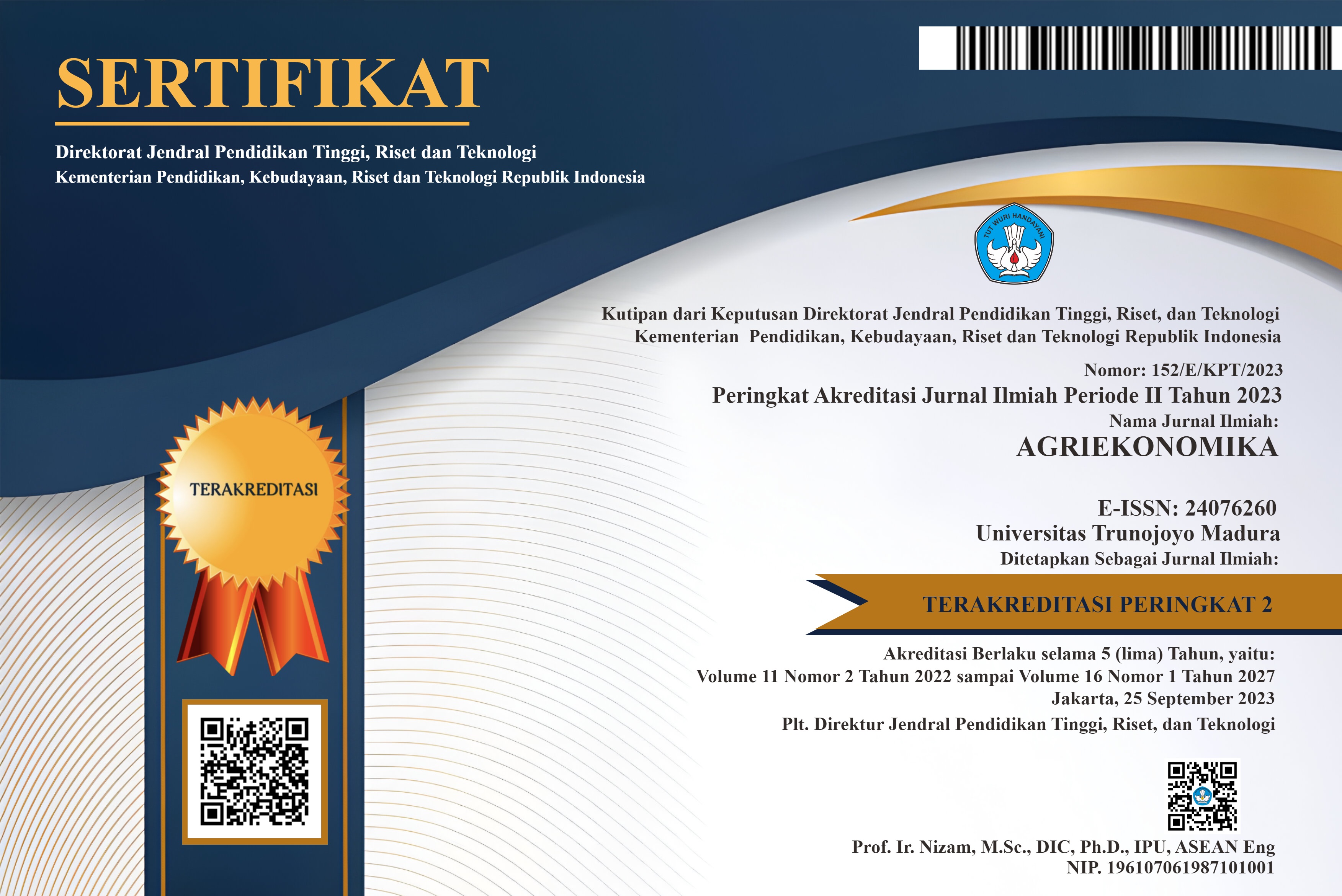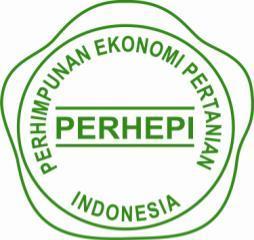Socio-economic Determinants of Adoption of Maize Production Technologies among Smallholders
Abstract
Agricultural technology adoption is germane for improved farm efficiency and productivity. Thus, the socioeconomic determinants of adoption of maize production technologies among smallholders were analyzed. Primary data collected via multi-stage sampling from 101 respondents was empirically evaluated using descriptive statistics and Logit regression. The respondent’s socioeconomic factors affected maize production technology adoption. Several maize production technologies were available in the study area; however adoption of these technologies among respondents was relatively low. The coefficient of multiple determination (R2) was 0.74827. The regression coefficients of household size (0.541), education (0.331), farm experience (0.615), farm size (0.448) and extension contact (0.457) were statistically significant at p<0.05 probability level. Furthermore, the constraints identified by respondents also affected the adoption of maize production technologies in the study area. This study recommends subsidizing technology cost, improved cooperative activities; access to technology, credit and extension services, farm labour supply and tenure policy modifications.
Keywords
Full Text:
PDFReferences
Abdulrahaman, A. A & Kolawole, O.M (2006). Traditional preparations and uses of maize in Nigeria. Ethno botanical Leaflets 10: 219-227.
Abebaw, D. & Abelay, K (2001). Factors Influencing Adoption of High Yielding Maize Varieties in South Eastern Ethiopia: An application of quarterly Journal of International Agriculture. 4(2).
Ajayi, P.Z, Odoul, O.C & Lagunya, A. (2008). Socio-economic factors influencing adoption of improved fallow practices among small holder farms. African Journal of Agricultural Research. 5(8): 818-823.
Alama, J.F (2001). Economic analysis of maize production using two technologies in Kaduna State, Journal of Arid Agriculture. 11:125-129.
Ali-Olubwanda, A.M, Odero-Wanga, D., Kathuri, N.J & Shigova W.A (2010). Adoption of improved maize production practices among small scale farmers in agricultural reform era: The case of western province of Kenya. Journal of International Agricultural & Extension Education ,17(1):21-30.
Bawa, D.B & Ani, A.O. (2014). Analysis of adoption of improved maize production technology among farmers in Southern Borno, Nigeria. Research on Humanities and Social Science. 4(255):43-54.
Federal Ministry of Agriculture (FMA) (2005), Annual Report, Nigeria.
Frova, C., Krajewski P., Fonzo, N.D., Villa, M & Sari-Gorla, M (1999). Genetic analysis of drought tolerance maize by molecular markers. Theory and Applied Genetics.99:280-288.
Greene, W.H. (2003). Econometric Analysis. Fifth edition. Prentice Hall, New Jersey.
Idrisa, Y.L.H & Ngandu, M.B. (2012). Effect of adoption of improved maize seed on household food security in Gwoza EGA of Borno State, Nigeria. Global Journal. 12(5).
Iken, J.E & Amusa, N.A (2004), Maize research and production in Nigeria. African Journal of Biotechnology.3 (6): 302-307
International Institute of Tropical Agriculture (IITA) (2001). Annual Report on Maize. IITA Publication.
Knowler, D & Bradshaw, B. (2007). Farmer’s adoption of conservation agriculture, a review and synthesis of recent research, food policy, 52:25-48
Komolafe, S.E, Adeseji, G.B & Ajibola, B.O. (2010). Determination of adoption of improved crop practices among women farmers in Ekiti East LGA of Ekiti State,Nigeria. Journal of Agricultural Research, 5(2):22-33
Manyong, V.M., Makinde, K.O. & Coulibaly, O. (2003). Economic gains from maize
varietal research in West and Central Africa: an overview. Maize revolution in West and Central Africa. Cotonou, Benin Republic: WECAMAN, Pp.66-80.
National Bureau of Statistics (NBS) (2012). Socio-economic Survey on Nigeria. First Quarter Report, NBS, Abuja
National Agricultural Extension Research & Liaison Services (NAERLS) and Federal Department of Agricultural Extension (FDAE, 2014). Agricultural Performance Survey of 2014. Wet season in Nigeria, Executive summary. Pp.23.
Okunade, E. (2006). Factors influencing adoption of improved farm practices among women farmers in Osun State. Journal of Human Ecology, 19(1), 45-49.Available at: https://doi.org/10.1080/09709274.2006.11905856.
Onuwa, G. (2022). Fostering Sustainable Productivity through Maize Technology Intensification: Participant responses, In: Handbook of Research on Green Technologies for Sustainable Management of Agricultural Resources, IGI Global, 427-436.
Onuwa, G.C., Mailumo, S.S. & Adepoju, A.O. (2021). Boosting Farm Productivity through Intensification of Soybean Production Technology. International Journal of Sustainable Agricultural Research, 8 (1): 61-70.
Ouma, J.O, Murithi M.F, Mwangi W, Macharia H.G & Gronte H.D (2002). Adoption of Maize Seed and Fertilizer Technologies in Embu District, Kenya. Mexico, D.F.: CIMMYT.
Rogers, E.M. (2003). Diffusion of innovation, fifth edition, New York, The free press.
Sabo, E. (2006). Participatory assessment of the impact of women in agricultural programme of Borno State. Nigeria. Journal of Tropical Agriculture, 44(2), 52-56.
Ume, S. I., & Okpukpara, B. C. (2006). Adoption of improved crop production technologies in Anambra State, Nigeria. A T and V system approaches. Paper presented at the Proceedings of the 20th Annual National Conference of Farm Management Association of Nigeria held at Forestry Research Institute of Nigeria 18 – 21 Sept. 2006.
Yahaya, M. K., & Aina, T. (2007). Role of Information source and communication channels in adoption of improved practices by farmers. Journal of Extension Education, 16(5), 37 –40.
DOI: https://doi.org/10.21107/agriekonomika.v12i1.14621
Refbacks
- There are currently no refbacks.







